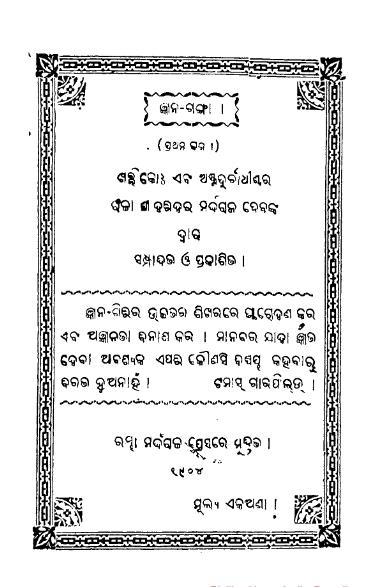Published in 1904, Gyanaganga, edited by Harihara Mardaraja, is a noteworthy contribution to the realm of general knowledge in early 20th-century India. The title translates to Stream of Knowledge, and this aptly reflects the book’s intent to provide readers with a comprehensive flow of information across a myriad of subjects. In an era characterized by the complex socio-political landscape under colonial rule, Gyanaganga serves not only as an educational resource but also as a vehicle for empowerment and enlightenment.
The turn of the 20th century witnessed a significant awakening in India’s literary and educational spheres. As nationalism began to rise, there was an urgent need for accessible, quality educational materials that could inform and inspire the populace. Against this backdrop, Gyanaganga emerged as an essential tool, aimed at fostering a well-informed citizenry capable of engaging with contemporary issues and contributing to society.
Gyanaganga is structured to provide a wide-ranging exploration of various topics, making it a comprehensive reference for readers. The book covers subjects such as:
History: Key events, figures, and milestones from Indian history and around the world are detailed, offering insights into the past that shape current realities.
Geography: Information about different geographical regions, their significance, and cultural dimensions helps readers understand the world’s diversity.
Science and Technology: Presenting fundamental concepts and recent advancements, the book educates readers about the principles governing the natural and technological world.
Culture and Religion: Exploring the rich tapestry of Indian culture and various religions, Gyanaganga fosters appreciation for the subcontinent’s vast heritage.
By presenting this expansive array of topics, Gyanaganga provides a foundation for readers to grasp the interconnectedness of knowledge across disciplines.
The educational value of Gyanaganga cannot be overstated. Written in a clear and engaging style, it caters to a broad audience, making complex subjects accessible to readers of varying backgrounds. The book’s emphasis on factual information is complemented by explanations that encourage deeper understanding.
One of the core strengths of Gyanaganga is its ability to promote critical thinking. By providing information in an organized manner, it encourages readers to think analytically about the content and draw connections between different areas of knowledge. This approach not only informs but also empowers individuals to form their own opinions and engage in thoughtful discussions.
The legacy of Gyanaganga endures as a significant educational resource from early modern India. As one of the pioneering general knowledge compilations in the region, it set a benchmark for future works. By emphasizing the importance of knowledge in fostering awareness and empowerment, the book contributed to a growing literacy movement that aimed to educate the masses.
Furthermore, Gyanaganga played a crucial role in shaping discourse around education and its relevance in society. It highlighted the need for well-rounded knowledge, encouraging individuals to embrace a lifelong pursuit of learning. This message remains pertinent today, as education continues to evolve in an ever-changing world.
Books Info
| Books name | Gyanaganga / ଜ୍ଞାନଗାଙ୍ଗ |
| Author | Harihara Mardaraja, Ed. |
| No Of pages | 16 |
| Publisher | NA |
| Publication | 1904 |
| Printed At | Ramba Madhharaj Press |
| Distributor | NA |

